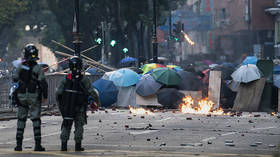Bolivian Senate voids ousted president Evo Morales' election victory
Bolivia’s Senate has passed legislation canceling Evo Morales' victory in the October presidential election, which was followed by a coup that forced him to flee the country. The bill also opens the door for new elections.
The bill on new elections was passed unanimously, the Senate confirmed on its Twitter page. The legislation will now need to get the approval of the lower chamber of the national parliament before self-proclaimed interim president Jeanine Anez signs it into law.
The bill effectively annuls the result of October's election which saw Morales eventually winning by a wide margin and sparked massive protests. It also allows for a new vote to be held without setting a specific date.
Also on rt.com Bolivian coup government seeks to prosecute Morales for TERRORISM over alleged call to block roads in protestIt also bars any candidates who earlier served two terms from seeking re-election, thus preventing the ousted president, who has since fled to Mexico, from joining a new ballot.
The Bolivian Congress will also have to form a new seven-member electoral court after the previous one was disbanded amid vote-manipulating allegations.
Later on Saturday, Opposition Senator Jeanine Anez, who has since declared herself “interim president” rejected a draft proposed by Morales’s Movement for Socialism (MAS) to grant amnesty to the deposed president and a number of high-ranking officials.
“We can not provide protection to those who have … persecuted, deceived and cheated Bolivians.” Anez said.
#Último En la Cámara de Senadores se trata un Proyecto de Ley de Inmunidad para Evo Morales, Álvaro García Linera y otras exautoridades y dirigentes del MAS. #ANFpic.twitter.com/b0XXrxkCzi
— Agencia Fides (ANF) (@noticiasfides) November 23, 2019
The new vote comes as the 'interim government' attempts to resolve what is arguably the worst political crisis the nation has seen in more than a decade and a half. Even though Morales was de facto forced into exile, his ouster did not bring calm to Bolivia. On the contrary, crowds of people took to the streets to protest the new government, only to face a police crackdown.
Most recently, law enforcement tear-gassed mourners carrying the coffins of persons killed in previous clashes.At least 32 people were killed in outbreaks of violence since the October elections, according to AFP.
Also on rt.com WATCH Bolivian police fire tear gas at mourners carrying coffins of protesters killed in previous clashesMorales, a president seen as representing indigenous peoples and a veteran of the Latin American left, sought a fourth presidential term earlier in October after ruling Bolivia for about 14 years. Yet, this time he faced fierce resistance from the opposition, which claimed the vote was rigged. Eventually, he had to resign under pressure from the military and sought political asylum in Mexico.
Bolivian cities have, meanwhile, descended into chaos, with both supporters and opponents of the ousted president hitting the streets.
Morales designated himself as a victim of a coup and denied allegations he was instigating rallies in his support from Mexico. He also said he would not run in a new vote if the people of Bolivia do not want him to.
If you like this story, share it with a friend!













